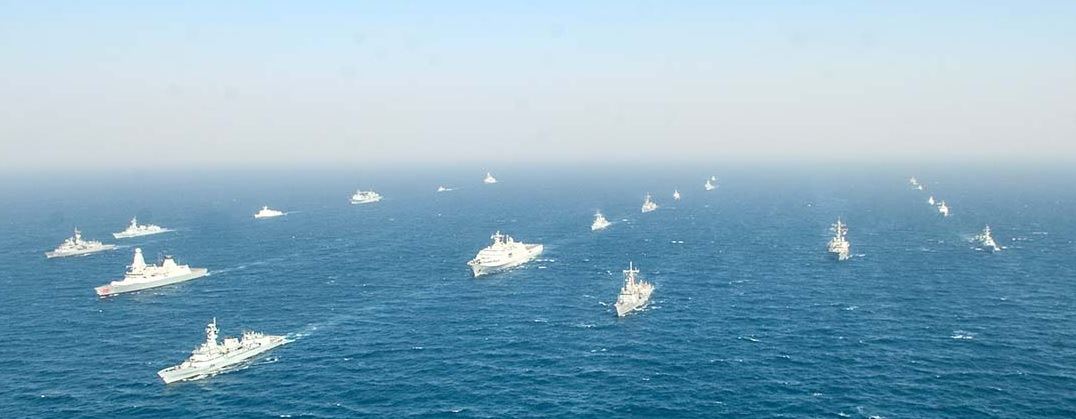North Arabian Sea would soon be buzzing with naval activity. As many as 45 navies are congregating in Karachi to participate in multinational maritime exercise ‘Aman-2021’ being held from February 11 to 16. In its seventh iteration, ‘Aman-2021’ is a biennial fixture in Pakistan Navy’s calendar, and will involve joint naval drills, international fleet review, a professional international maritime conference and social events. Although ‘Aman-2021’ can be labelled as a routine event; yet, at least three issues merits consideration.
First, is the presence of the Russian Navy at the event which is being seen as a rapprochement between Russia and Pakistan driven by a number of political, economic and strategic consideration such as situation in Afghanistan where Moscow sees Islamabad as an important stakeholder; importance of Pakistan in Russia’s Greater Eurasian Partnership (GEP); Pakistan Stream Gas Pipeline between Port Qasim (Karachi) to Kasur (Punjab) for the transportation of Re-gasified Liquefied Natural Gas (RLNG); emerging Russian naval footprint in the Indian Ocean through its military-naval facility at Port Sudan; and the growing partnership between the US and India.
The Russian Defence Ministry have also announced that three Russian Navy ships (frigate, a tanker and a rescue tug boat) from the Baltic Fleet will conduct joint drills with Iran and China in the Indian Ocean in February 2021 which is similar to the trilateral maritime exercise titled Maritime Security Belt held in the Gulf of Oman in December 2019.
Second is about participation by the PLA Navy at the event which is not a surprise given that it has been part of the Aman series since the time Pakistan Navy first set it up in 2007. However, in a candid interview with the Chinese state-run media outlet Global Times, the Pakistan Navy chief Admiral M Amjad Khan Niazi has admitted that the role and responsibilities of the Pakistan Navy are growing exponentially with the operationalization of the China-Pakistan Economic Corridor (CPEC) connecting Kashghar in Xinjiang, western China and Gwadar in Pakistan.

The Pakistan Navy has accorded high priority to the security of the Gwadar port and its operations. This is best understood by the fact that it deployed ships and aircraft to provide security cover to ensure safe and secure transit of cargo ships MV Cosco Willington and MV Al-Hussein which were carrying containers that had arrived from Kashgar through the CEPC to Gwadar.
Also, their bilateral cooperation involves Sea Guardian series exercises, training and high-level exchange visits. In particular the Sea Guardian-2020 was held in the Arabian Sea in January 2020 and was coordinated by the PLA’s Southern Theater Command. These exercises had included a Chinese submarine rescue ship raising doubts about the possibility of a Chinese submarine lurking around, which was later proved correct.
Pakistan Navy also has ambitious plans to transform into a blue-water force for which it needs Chinese support for modern naval hardware. It has contracted for eight Hangor-class submarines, four Type 054A/P frigates, missile fitted fast attack craft, helicopters, medium-altitude long-endurance unmanned combat aerial vehicles and a state-of-the-art survey ship.
Third is about Turkey which like China attended the first Aman Exercises in 2007 and was represented by the token presence of its SOF/EOD Teams; thereafter its participation had remained intermittent. However in 2019, Turkey dispatched TCG Gokceada, a Gabya Class Frigate for Aman-2019. It is useful to mention that Turkey and Pakistan have good naval cooperation. A Turkish company built a naval replenishment tanker at the Karachi shipyard for the Pakistan Navy; Turkey's Defense Technologies Engineering and Trade Inc. (STM), Havelsan and Aselsan are engaged in the modernization of Pakistan's Agosta 90B submarines; and Pakistan is acquiring 4 MilGem Class corvettes for which the keel was laid in June 2020. These could be fitted with Chinese C-802 or Harbah anti-ship cruise missiles, and Chinese made 16-Cell VLS medium-range surface to air defense missiles.
Although Aman-2021 is themed ‘Together for Peace’, it is a perfect recipe for geopolitical and geostrategic contestation in the Arabian Sea. In this context, it is useful to mention that trilateral Maritime Security Belt involving China, Russia and Iran held in the Gulf of Oman in December 2019 and the Sea Guardian-2020 involving China and Pakistan were the potential triggers for Australia, India, Japan and the US to conducted Malabar exercises in the Arabian Sea in November 2020.
(Dr Vijay Sakhuja is former Director of National Maritime Foundation, New Delhi)




















